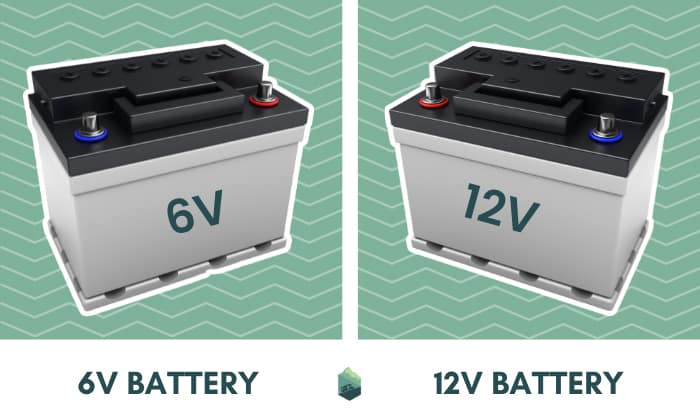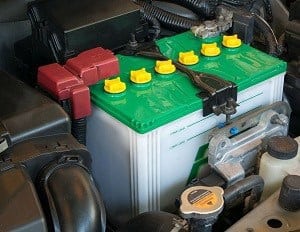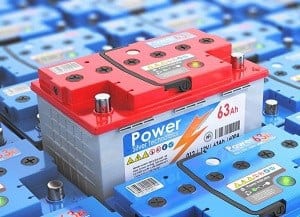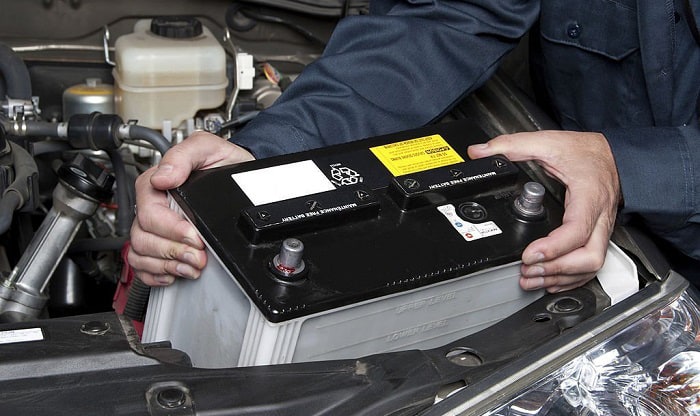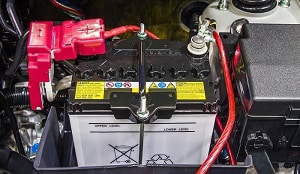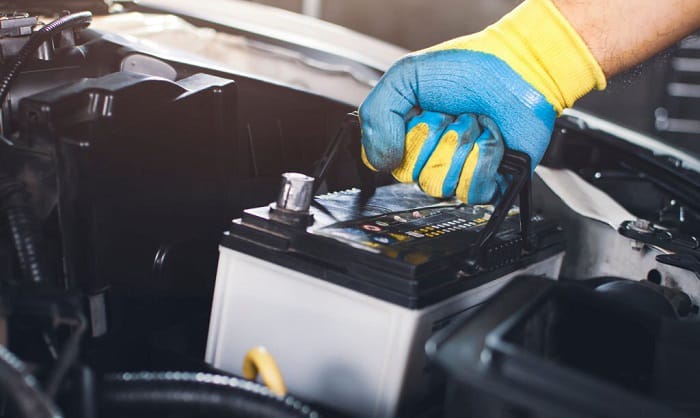No matter how big your rig is, you’re still going to want a reliable source of power on-board. Need a boost? The different voltage levels of these batteries might make it difficult for you to decide which one you need.
Whether it’s a 6V vs 12V battery, there are key differences between them worth noting. Read our detailed guide to help you find the best battery for your camper van.
Page Contents
What Are 6V and 12V Batteries?
1. A 12V battery
If you’re in the market for RV house batteries 6V or 12V, know that 12V batteries are used for most cars and trucks. They offer a lot of power and are very reliable, but they require a large amount of space due to their size.
These are also known as “maintenance free” batteries because they do not require any kind of maintenance whatsoever. You simply install them in your vehicle and forgo topping up distilled water.
2. A 6V battery
6V batteries are typically used on construction lighting, RVs, electric vehicles, and other similar vehicles where space is limited or where weight needs to be reduced as much as possible.
Because their output is considerably longer and provides a higher amount of power, they are usually the preference for golf cart batteries.
The 6-volt battery was first used in early cars and trucks, but it has largely been replaced by the 12-volt battery. However, some people still prefer 6V because of its longer life span despite the downside of having a lower voltage.
To make up for this, most modern vehicles use a 12V system with two 6V batteries wired together in series. This arrangement allows each cell to deliver more current than if they were connected separately, so starting an engine is faster than with one large 12V battery alone.
When it comes to the choice of battery, there are many options available in the market. The most common choices are batteries either with 12 or 6 voltages.
But how do you know which one to choose? Let’s discuss in detail the differences between 12V vs 6V battery so you can decide for yourself which one you need.
6V Battery vs 12V Battery Differences
1. Voltage
It refers to the ability to produce electricity at a particular level of current (amperage). When the voltage is higher, (measured in volts), the more powerful it is.
If you want your car’s engine to run smoothly, you need enough power from your battery so that it can start up all vehicle components such as lights, heater fan and radio/CD player.
This would explain why, in the 6 volt battery 12 volt system contest, 12V batteries are more popular than the former.
2. Longevity
In a contest between 6V vs 12V deep cycle batteries, due to 6V batteries utilizing heavier plates for each cell, they last significantly longer in contrast to two 12V batteries.
The difference is even more apparent in settings where deep charges and discharges are used. The same case applies in favor of 6V even in series amp hours.
In contrast, 12V batteries have thinner plates and thus tend to wear out rather quickly when used in deep-cycle applications. This is because the thinner plates are more likely to lose their capacity over time as they lose their ability to hold a charge.
The thicker plates of 6V batteries allow them to withstand this kind of abuse better than their lighter counterparts. When it comes to 6V vs 12V amp hours, 6V would be the winner.
3. Size and Weight
The 6 volt vs 12 volt RV batteries size is an important consideration because you better make sure that it will fit in your vehicle. 12V batteries are significantly heavier than the 6V versions.
If you want to have no trouble lugging one around when you need to install it, then 6 volt RV batteries will be more manageable for you especially when you’re on your own. They’re much lighter even when you’re using two of them to run a series.
Pros and Cons
1. 12V Batteries
- Can be connected in series for RV or even in parallel circuits to double the number of amp-hours available and make up for what it lacks in terms of storage capacity
- Consistent usage with no drops in voltage
- Relatively cheaper and easier to find in auto parts shops or local garages
- Generally longer lifespans especially with 6 volt deep cycle battery for RV
- Larger amp-hour capacities
- Weigh less
- More frequent charge and discharge cycles
- With the help of a series, it’s manageable to have twice the juice power with smaller and lighter batteries
- Available in 2 or 4 6 volt batteries for RV sets as well
2. 6V Batteries
- Generally longer lifespans especially with 6 volt deep cycle battery for RV
- Larger amp-hour capacities
- Weigh less
- More frequent charge and discharge cycles
- With the help of a series, it’s manageable to have twice the juice power with smaller and lighter batteries
- Available in 2 or 4 6 volt batteries for RV sets as well
- Need extra knowledge on how to wire a series to use double batteries
- More expensive and harder to source in the market especially in smaller towns but you might have more luck with popular brands like 6 volt motorhome batteries
- Size incompatibility with smaller vehicles which might not fit multiple batteries on the taller scale
Frequently Asked Questions
Are two 6-volt batteries better than two 12-volt batteries?
The voltage of a battery is only one of many factors to consider when choosing a battery.
If we connect two 6V batteries in series, we will end up with an overall voltage of 12 volts. We can also connect two 12-volt batteries in parallel to get 24 volts.
When using two 6V batteries, it will have more amp hours. Amp hour capacity measures how much current a battery can supply for an hour before it is fully discharged.
In most cases, though, other factors (the ones listed above) come into play when deciding whether or not two 12-volt batteries or two 6-volt batteries are better suited for our application.
Is 6V or 12V faster?
In general, 12V would win this one. The reason for this is that when you go from a 6-voltage battery to a 12-voltage battery, you are effectively doubling the amount of voltage.
Therefore, you can increase the current flowing through the same motor by half and still produce the same power.
When you do this, the acceleration is greatly improved because it takes less time for the motor to reach full speed. So yes, 12V batteries are faster and more powerful than their 6V counterparts. But again, this is just one part of the bigger equation.
Can I choose a 12V battery instead of a 6V battery?
The answer to the question depends on what you are doing with your battery.
The voltage difference is due to the fact that batteries are rated by how much energy they can store (in amps x hours), and not how much power they can supply instantaneously.
A 12 volt battery has twice as many cells inside (6 vs 3) as a 6 volt battery – meaning it can provide twice as much energy over time. But in terms of instantaneous power it’s only four times greater.
Conclusion
The best type of battery for you to have depends entirely on your needs and expectations when it comes to power usage. While it is true that 6V batteries have less overall power than 12V batteries, 6V excels in its longevity and portability features.
Checking the voltage of a 6V vs 12V battery is not enough to determine what type is best. Being aware of specifications that differentiate models and how they can affect how the battery works will save you money in the long run and ensure you are using a product that is right for you.
“Hi, I’m Francis’ husband—Calvin. Our story began with our shared passion for traveling. I have had a career journey for over 11 years at Ford Motor Company, where I took on the role of BMS SW Process Engineer.
Together with my wife, I have dedicated countless hours to exploring every nook and corner of the world. Ten years living in an RV may seem long, but time seems to fly by when I’m doing what I love with the person I love.
FMCA’s 103rd International Convention & RV Expo in Gillette, WY,
Like my wife, I hope to help you see the beauty of traveling off the beaten path by sharing insights into this lifestyle. In addition to my corporate roles, I also launched our website – Outdoorbits, in 2015 and continue to contribute my knowledge and skills to the present day. And I’ll be completely honest with you—no hiding the truth or sugarcoating the possible challenges.
So, if you want to run away from the busy lifestyle to embrace nature, I’m your guy.”
